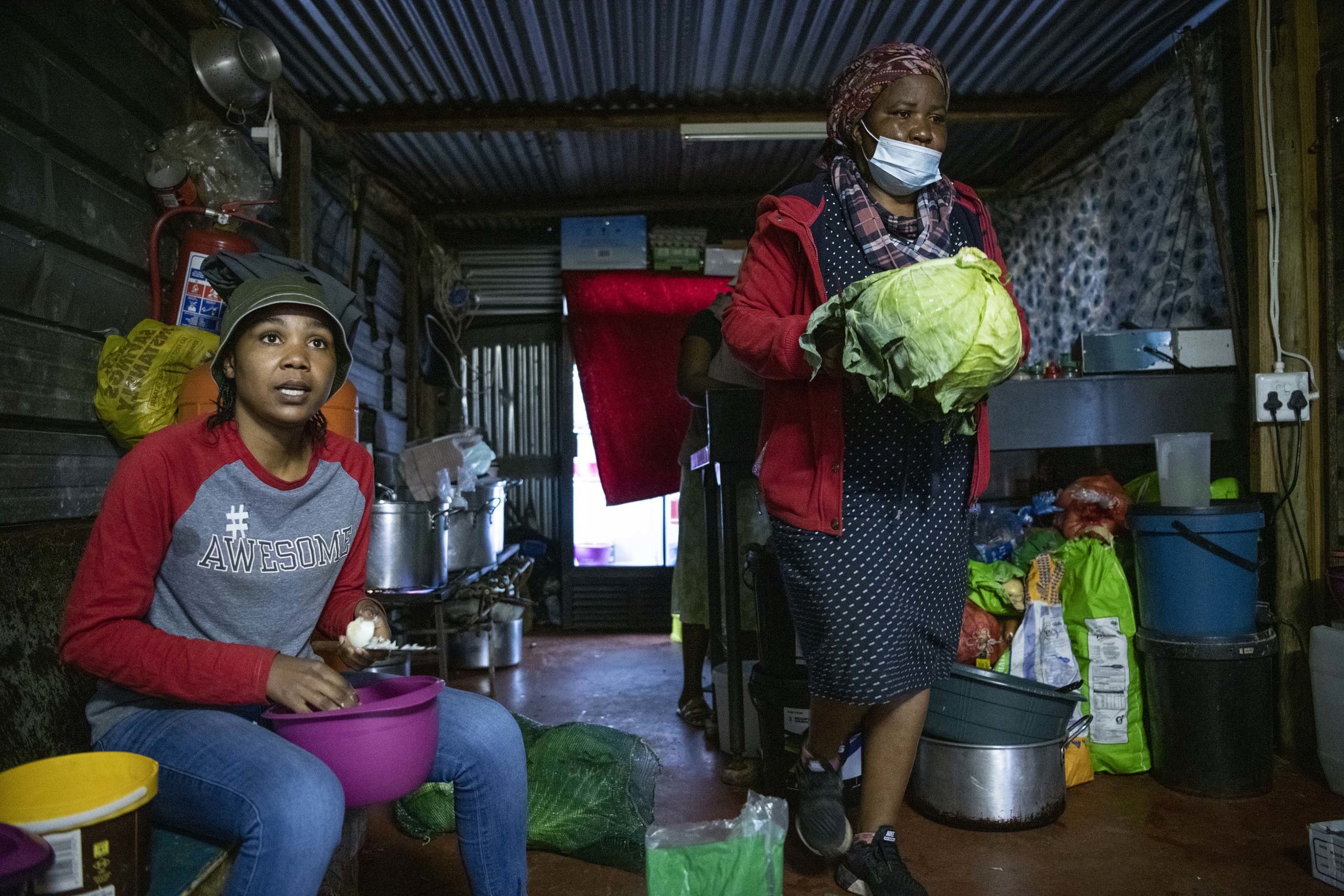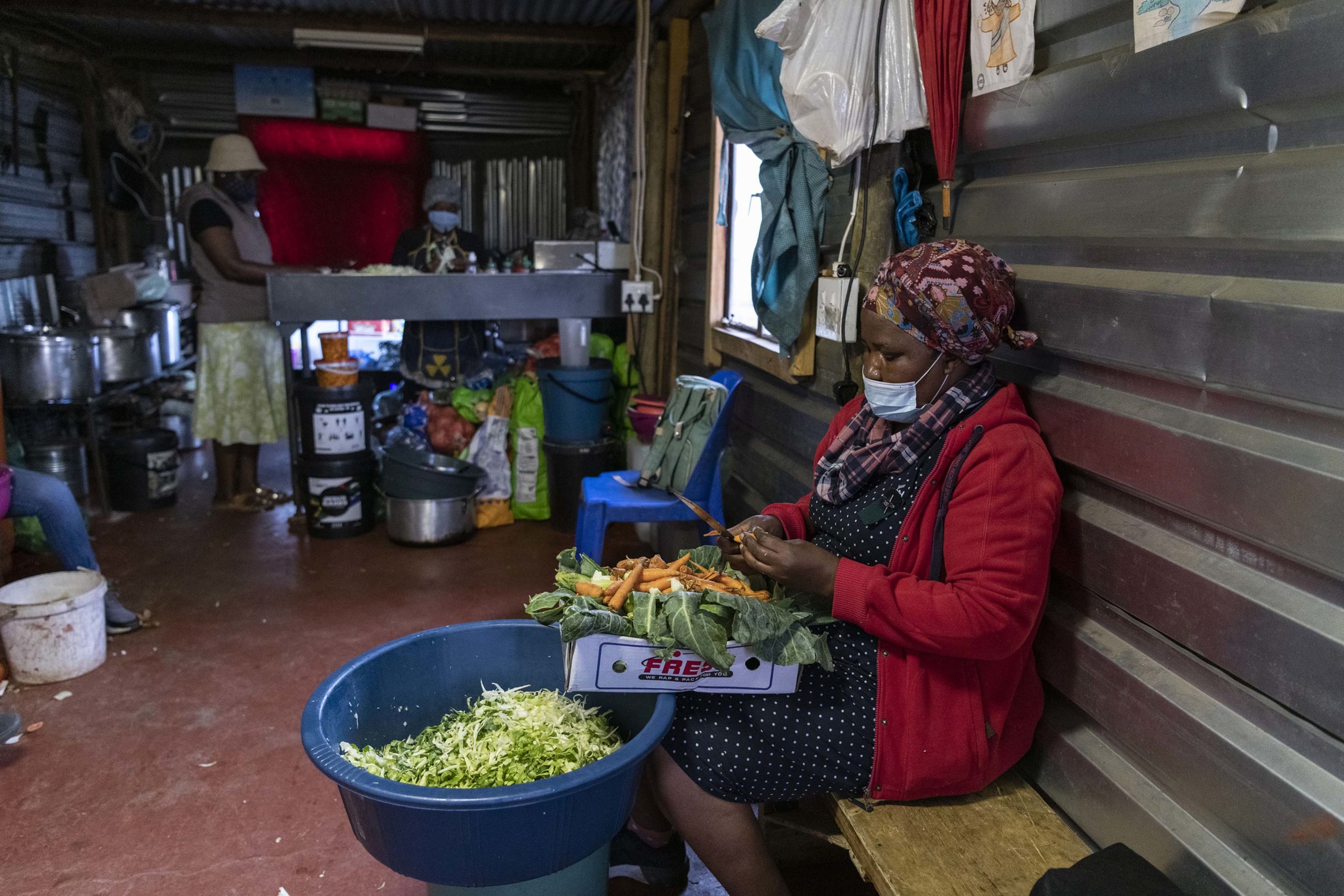Fighting hunger in Joburg, one meal at a time
Moved by the plight of impoverished people around her at the height of the Covid-19 lockdown, one woman decided to do something – and has made a material difference in their lives.
Author:
10 September 2021

Sanny Mashigo, 48, cooks and sells food to industrial workers around Strydom Park in Randburg, in the northwest of Johannesburg. But when Covid-19 came, with its lockdowns and regulations tearing livelihoods apart, her business and income were not spared.
Mashigo stocks up in bulk for her business. With the initial lockdown, unable to cook, move around and sell, she found herself with so much groceries that she knew not what to do with it. But then she looked around her area, a shack settlement of about 600 households called Organic Market near Bramley View. What she saw was nothing but struggle – the socioeconomic devastation caused by the lockdown was unbearable, she said.
Many of the residents were, and still are, experiencing extreme hunger.

“You must bear in mind that the people that stay here work in restaurants, retail stores and liquor shops,” said Mashigo’s daughter, Mmasechaba Mashigo, 28. “[They are] domestic workers, waiters and more… These people don’t have the luxury of working from home. The jobs that are affected the most by the pandemic are those of people who stay in informal settlements.”
Mashigo converted her corrugated iron garage into a food kitchen so she could feed the hungry, especially children who often go to school on an empty stomach. “We feed about 200 kids and 50 adults, mostly women,” said Mmasechaba, who helps her mother run the kitchen, along with three other women who are themselves unemployed, some having lost their jobs owing to the pandemic.
They run the food kitchen from Monday to Friday. For seven months, without any sponsors, Mashigo sustained the food kitchen with her personal savings. “We cannot end hunger, but this is a step forward to [reducing it]. One day the statistics of hunger will change,” Mmasechaba said.
Before becoming a residential area in the 1990s, the place was a site for fresh vegetable produce – hence the name Organic Market. Craft pieces and sculptured art were sold there too. It is sandwiched by Alexandra township and some northern estates and suburban houses. Many people moved there because of a need for accommodation or homes closer to places of employment.
Pleasantly surprised
Organic Market and Mashigo’s food kitchen are closer to 9th Street, one of the busiest roads in Bramley View. Passers-by would see many people queuing there and be curious, she said. Some would come to investigate further and, to their surprise, discover the women’s good deeds – a whole feeding programme for impoverished families, breakfast and lunch.
Touched by this, some would then donate whatever they had, just to sustain the kitchen.
Mmasechaba said they now receive donations from people on social media, and they value them.
“I used to post online saying that my mother is giving back to the community. But, when we ran out of money … I started using social media to solicit funds to continue with the food kitchen,” she said. “I really value the people on social media, they always pull through for us. Other people also come and say, ‘I saw your post the other day, but I did not contact you because I did not have money. Now I have it and let me send you a food voucher.’”
She recalls one occasion when a child who had been chased away from school for not having school shoes was helped by social media users. “I went to Twitter and posted the challenge that the child was facing. Someone offered us money. We bought the child school shoes, pants and basically a full uniform. [Their] guardian came crying [to us] in appreciation of what we did.”
Not long ago, the rest of the volunteers in the kitchen received an unexpected treat from someone on social media. “There was this good Samaritan who saw my post when I said I am tired and have never rested, because we do not [get to] go out to socialise. That person saw the tweet and sent me a direct message [saying] they’d come to take us to a spa massage,” Mmasechaba said, smiling. “The spa treat was nice. We came back renewed and refreshed.”
Help from other fronts
Apart from the random acts of kindness and generosity they routinely receive through social media, the Mashigos also get help from the Redemption Church, which is based in Greenstone near Edenvale. The church occasionally supports them through donations of clothes, food parcels and so forth.
Another entity that’s been helping them are the Chefs with Compassion, a collaboration of individuals, companies and organisations that work together to collect surplus food that would go to waste and donate it to kitchens that feed the hungry.

All food produced – in orchards, fields, pastures, greenhouses, feedlots and fisheries – is supposedly intended for consumption. However, according to a 2017 report on food loss and wastage released by the conservation organisation World Wide Fund for Nature, an estimated third of all food in South Africa is never consumed. It simply ends up in landfills, resulting in 10 million tonnes of mostly fruit, vegetables and grains going to waste.
This, of course, is a global issue. And it is not just the food that gets wasted, but also the resources involved in the production of it, such as fuel, money and labour.
Mmasechaba said everyone has a role to play to help stop this problem. “People engage in so much food wastage. Just don’t throw away food. There are people that need it more than you can imagine.”
Government dropping the ball
In times of turmoil, like this pandemic, and when the government has failed to provide an environment in which everyone thrives and instead inequality is rife, it is initiatives like these that make a difference.
But they are often frustrated by the government.
In an attempt to formalise their kitchen, the Mashigos applied for a certificate to be recognised as a non-profit organisation (NPO). Even though the Department of Social Development approved their application, they are yet to receive the certificate. And without it their work suffers.

“Our wish is to get a sponsor so that there could be stability. We’ve gone to so many retail stores and organisations, [but] always come [back] empty-handed,” said Mmasechaba. “Everywhere we go, they want an NPO certificate. Basically, the government is just failing to give us the simplest thing.”
While the department drags its feet, Mashigo has returned to her spot in Randburg. With lockdown restrictions relaxed, she can get back to her business of selling food again. The proceeds from this continue to ensure that the food kitchen does not collapse.
“Even if I don’t make [enough while] selling in the streets, I make sure that the kitchen has enough to get by,” Mashigo said. She has to buy the gas she uses for cooking in the kitchen, and 48kg of gas costs R1 400. It lasts only two weeks. On other days, Mashigo has so little that she does not know how to go about getting food for the children who have come to depend on her for food.
And in the midst of such stress, a miracle always seems to emerge. “My mother believes in prayer. I guess that’s why we’ve survived this long without solid sponsors. God always provides,” said Mmasechaba.



